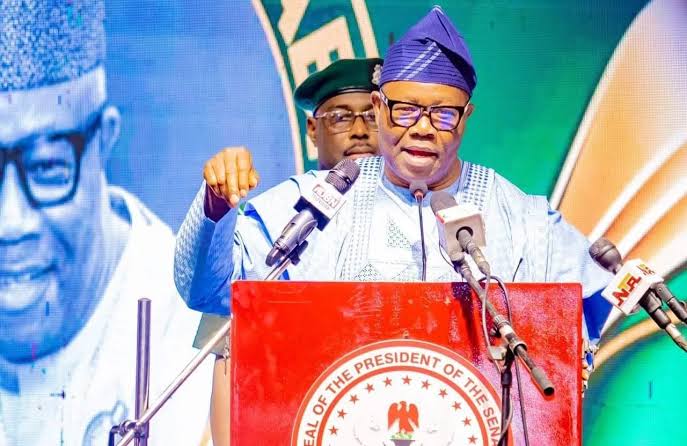The Nigerian political landscape witnessed renewed friction as Senate President Godswill Akpabio vehemently denied any involvement in the removal of former Senator Elisha Abbo from the National Assembly. Abbo, who represented Adamawa North Senatorial District, was sacked by the Court of Appeal in October 2023, a decision that paved the way for Amos Yohanna of the Peoples Democratic Party to assume the senatorial seat. However, in a recent television appearance, Abbo pointed fingers at Akpabio, accusing him of orchestrating his removal and operating the Senate with an authoritarian hand. This accusation reignited a previous contention between the two politicians, prompting a strong rebuttal from Akpabio’s office.
Akpabio’s media aide, Eseme Eyiboh, issued a statement expressing shock and dismay at Abbo’s renewed allegations. The statement highlighted Abbo’s previous public apology and retraction of similar accusations against Akpabio in 2023. At that time, Abbo had admitted his earlier accusations were premature and based on incomplete information. Akpabio’s office emphasized the inconsistency of Abbo’s stance, questioning why he would resurrect baseless claims he had previously disavowed. The statement underscored that the court, and not Akpabio, had determined Abbo’s fate, rendering his accusations illogical and irresponsible.
The statement further addressed Abbo’s claims of being unjustly denied official benefits following his removal, including salaries, allowances, and an official vehicle. Akpabio’s office clarified that any such claims would have to adhere to established legal procedures. The court’s declaration that Abbo’s tenure was null and void ab initio significantly impacts his eligibility for such benefits. The statement suggested that if Abbo’s claims failed to reach the Senate President’s desk, it was due to procedural deficiencies, not personal or political vendetta. It lamented Abbo’s tendency to resort to “media theatrics and reckless finger-pointing” instead of accepting the legal and political consequences of the court’s decision.
Akpabio’s office maintained that the Senate President remains focused on the critical task of nation-building, providing effective leadership within the Senate, and upholding the independence of the judiciary. It asserted that Akpabio would not be diverted by individuals attempting to manipulate historical narratives to obscure personal failures. The statement urged Abbo to engage in self-reflection, respect the rule of law, and concentrate on regaining the trust of his constituents if he aspired to return to public service. It emphasized the importance of maturity, responsibility, and respect for the truth among political actors for the healthy functioning of Nigeria’s democracy.
The statement serves as a robust defense of Akpabio’s actions, portraying him as a dedicated public servant focused on national interests. It simultaneously criticizes Abbo’s behavior, framing his accusations as baseless attempts to deflect responsibility for his own political setbacks. The public exchange between the two highlights the often volatile and personalized nature of Nigerian politics. It also underscores the importance of upholding the rule of law and the independence of judicial processes, even in the face of political pressures.
This incident also brings to the forefront the challenges faced by Nigeria’s evolving democratic institutions. The need for greater transparency and accountability in political processes is evident, as is the importance of fostering a culture of respect for legal decisions. The episode serves as a reminder of the ongoing struggle to solidify democratic norms and practices within the Nigerian political landscape, a struggle that requires both institutional reforms and a shift in the political culture towards greater responsibility and adherence to the rule of law.


